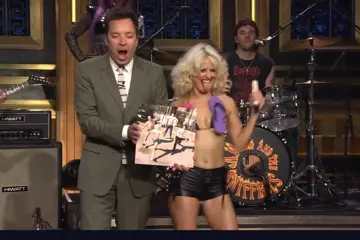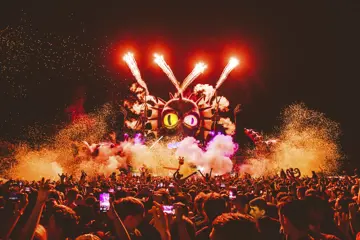This morning, the Queensland state government won its protracted battle to gain enough votes to pass its much-maligned Tackling Alcohol-Fuelled Violence Legislation Amendment Bill after a last-minute (and unexpected) deal was reached with MPs Bob Katter and Shane Knuth, of the Katter Party.
Supporters of the bill — which introduces a 2am last-drinks policy except in certain venues allowed to serve until 3am (with the stipulation of a 1am lockout), among other measures — have long maintained that reduced trading hours are the key to curbing the state's obvious problem with alcohol-fuelled violence.
To that end, they've cited examples from similar measures taken in Newcastle and the corpse of Sydney, along with several studies from around the world claiming that pretty much the one surefire way to lower alcohol-fuelled assault rates is to place limits on when and where the general populace can enjoy themselves. Granted, as a result of Palaszczuk's deal with the Katter Party, the lockout stipulation won't come into effect until February 2017 instead of its originally proposed July 2016 date, but it's still coming, and its impact will still be devastating for the state's nighttime economy. (Well, except for the state's casinos, of course, who conspicuously remain exempt from all of it despite those venues not exactly being devoid of violent incidents of their own.)
Now, literally nobody is saying that alcohol, drugs and latent violent tendencies are a good combination. Indeed, as local activist group Our Nightlife Queensland wrote today, "...we all agree that drug use, violence and intoxication are a terrible mix". There's no arguing with that. But the problem with these laws — the elephant in the room that nobody seems willing to discuss — is that they focus solely on treating the symptoms of only one part of the problem (i.e. service of alcohol) and completely ignore the much larger, and harder-to-fix, issue, which is the Australian culture's fascination with and acceptance of simply drinking to get drunk, as well as an underlying reliance on violence as a means of problem-solving.
The laws, in essence, presume that everyone out at a venue after midnight is already irredeemably drunk. This, while not a totally unfounded assumption, is certainly not always the case. For example, hospitality workers who finish in the later hours of the evening/early hours of the morning will often head out for a post-shift cold one or a few, but these laws will rob the very people who have given up their evenings to wait on the rest of us of the right to enjoy even a single drink once they knock off, especially at nightclubs with the enforced 1am lockout.
So, politicians and lawyers can knock back a million glasses of red when they leave the office after a hard day of worrying about themselves, but the blue-collar front line who had to serve them all night aren't entitled to the same opportunity just because of the time of day that they finish work?
Certainly, there is some merit to the idea that people won't drunkenly bash other people if they can't keep getting fresh drinks until sunrise — although, be real, it's not because they don't want to keep drinking, and the notion that there's some kind of 'magic hour' at which the issue becomes an exponentially greater threat than any other time of night is patently absurd.
It was just after 10pm the night that 18-year-old Thomas Kelly was fatally felled by a one-punch attack in Kings Cross. As uncomfortable a thought as it may be, regardless of the presence of lockouts, service restrictions or otherwise, that attack was going to happen on the night of 7 July 2012. Daniel Christie was attacked sometime after 9pm on New Year's Eve 2013. It's the same story with Gold Coast one-punch victim Sam Ford, who was also attacked about 10pm and now suffers a litany of impairments as a result of his injuries.
His mother, Margaret, explained to the ABC, "The people that are going out there and bashing people are people that would bash people anyway, [even] if they weren't under the influence of alcohol."
The unfortunate truth is that she's right. In fact, during my stint in hospitality in far-north Queensland, I actually worked with a guy who sidelined as a bouncer at a well-known nightclub and ended up contributing to the death of a 19-year-old with one punch after a scuffle broke out inside the venue — the accused was off-duty at the time — and the men "took things outside". The victim lost his life after cracking his skull on the pavement as he fell from being struck.
Hell, as a barman I was even physically threatened — repeatedly — by angry drinkers who I'd had to cut off from further service at any time of night, not just after midnight or 1am.
But we're really sticking with this whole "reduced trading hours will solve everything" line, huh? Wasn't this what responsible service of alcohol laws were supposed to address? The government knows that "pre-gaming" is a thing, right? Maybe if we weren't so enamoured of the idea of getting blotto every time we go out in the first place, we also wouldn't see as many of these horrendous situations where innocent people lose their lives because some wanker has terrible impulse control.
But it's not just drunkenness — not alone, anyway — that needs to be addressed here. I've been going out to clubs and venues in Queensland for over a decade now, I've spent several years behind a bar, and I have almost never known a lockout-free environment. Soon after I turned 18, the state government pushed through its initial restrictions on venues, which saw the implementation of a 3am lockout for Qld's nightlife hubs, so the majority of my experience has come with an entry caveat.
You know what I have known the entire time I've been legally going out, though? Violence and anti-social behaviour. I saw literal brawls on the street because people were suddenly trapped outside with other people, some of whom had had too much to drink, the unexpected overcrowding heightening tensions to boiling point. I saw dudes openly pissing into a nearby creek because they couldn't get into a venue to use a toilet. The situation was exacerbated by hours-long queues for taxis, woeful public transport, scant police presence and poor crowd management.
When the lockouts weren't enough, they brought in no-glass policies at hot spots to deal with all the people casually smashing their drink receptacles into the faces and bodies of other punters, oftentimes for infractions as insignificant as them perceiving being looked at the wrong way. Seriously, if your thought process when someone accidentally bumps into you in a crowded nightclub is "well, they deserve a schooner to the face for that", your problems go well beyond the help of any kind of restriction of service hours, but the rest of us are now going to have to put up with further limitations on how we enjoy ourselves simply because you can't pull it together and act like a civil member of society.
All of this — despite painting a pretty clear picture that maybe the real problem is with the way we treat alcohol in the first place, not to mention continually encourage the hyper-masculine ideal that violence is a solution to any disagreement — seems to get ignored because, ultimately, these restrictive measures can be argued as being effective, but it's only in the same way that taking Benadryl will help ease your smoker's cough while you're still sucking down two packs a day. Things might not seem quite as bad as a result, but the underlying problem still exists.
On an entirely anecdotal note — I have been drunk before and I have never wanted to beat anyone senseless. My friends have never expressed an interest in going out with the specific goal of finding someone to rough up. No, that particular impulse is not simply an endemic part of being under the influence; rather, it comes from an ingrained cultural failing that says it's OK to assert dominance through physical force, and rather than discourage the perpetuation of that notion — by providing better education, as well as following through with actual precinct-wide bannings for anti-social behaviour or implementing harsher penalties for individuals and groups who act in such a way — we're instead hoping that maybe we can fix the problem by just trying to ensure that these people can't get drunk enough to make the leap from thought to action.
But the way towards a solution for Australia's love of getting absolutely shit-faced and then uppercutting someone as a display of manliness is not to punish everyone in an attempt to teach a lesson to a few. It's a generational shift that needs to take place here; we should be championing the responsible consumption, not just service, of alcohol, not by locking it up but by reducing its cultural value, as well as an ideological move away from the idea that issues (or, more often than not in these cases, non-issues) should be solved with our fists rather than just walking away.
It's naive to think this could happen overnight, or even necessarily within a generation or two, of course. And, clearly, something must be done about it. But, in the words of Our Nightlife Queensland, heightened restrictions on general freedoms are "a dangerous step that will simply destroy small businesses, cause more harm in our precincts and push violence elsewhere".
Rather than another reason for the rest of the country to deride us as the nanny state, we need better procedures and actual solutions for nightlife hubs to be able to remain open and contribute to Palaszczuk's vision of Brisbane as a "new world city", because shutting it down — along with the rest of the state — and chaining it up in red tape is misguided at best, and detrimental at worst.















